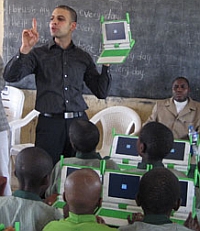MIT for High School
Most of you have heard about MIT's OpenCourseware project. OCW is the free publication of materials used at MIT from over 1800 courses made available to the public.
Now, Massachusetts Institute of Technology is making freely available to high school students and their teachers a collection of material in science, technology, engineering, and mathematics. The material is available on a new part of the original site at http://ocw.mit.edu/highschool and features video and audio clips, animations, lecture notes, and assignments.
Of course, depending on the grade level you teach, many of the materials that have been available for the "college" level are useful to high school teachers. There are introductory courses in Biology, Chemistry, Computers and Electronics, Engineering, Foreign Languages, Math, Media, Music and the Arts, Physical Education, Physics, Social Sciences, Writing and Literature.
The intent is not just to have teachers find and use materials. Many of their users are students studying on their own.
“We hope it will inspire students to reach beyond their required classwork to explore more advanced material and might also encourage them to pursue careers in science and engineering,†said Susan Hockfield, president of MIT, in a written statement.
One area that I found really interesting offers courses developed and taught by MIT students for high school students. You can take a quick look at a sample from sample from the Educational Studies Program (ESP), an MIT student group offering high school courses for over 50 years.
There's a class on "Guitar Building." A music course?
"In this class, students learn about physics principles by examining the physics responsible for producing music with electronic stringed instruments, while building, testing, and playing their own electric guitar. Students will design their own guitar bodies, construct their own pick-ups, assemble their own guitars, tune them using a chromatic tuner, and use them to play a simple song. While the instructions here give enough detail that an independent learner could construct their own guitar, please note that this activity should only be attempted with proper adult supervision, whether at home or at school."
I also like the "Knowledge in Action" area with sections on "Write Better," "Save the World," and "Build Stuff." In with the things you'd expect to find (robotics, mechanical engineering) are problem-solving activities like "Toy Product Design" and global studies like "Information and Communication Technology in Africa."
 That last course made me think about the OLPC that Tim has on order. What a great unit you could do if you purchased a give-one-get-one laptop (that offered has been extended until 12/31/07) and used these materials to flatten your classroom world a bit to look at technology in developing countries.
That last course made me think about the OLPC that Tim has on order. What a great unit you could do if you purchased a give-one-get-one laptop (that offered has been extended until 12/31/07) and used these materials to flatten your classroom world a bit to look at technology in developing countries.
I looked through the course materials and, sure enough, there was a document on "Policy for the Introduction of the $100 Laptop into Schools in Zambia" by Mark Scott (PDF).Then have students investigate the OLPC Wiki.
We have been trying at NJIT to get an open courseware effort started, but are still dealing with issues like intellectual property that MIT seems to have overcome. I was happy just to see some of our faculty agree to make their courses in our iTunes U site public, so that's a move in the right direction.
At all grade levels, you find teachers who want to share materials and those who guard them closely. The MIT site reminds you that "OCW is not an MIT education. OCW does not grant degrees or certificates. OCW does not provide access to MIT faculty. Materials may not reflect entire content of the course."
And we all (teachers & students) know that good materials do not necessarily make a good course. I have always believed that a great teacher in a room full of students with no materials will still make learning happen. Equipping those teachers with good materials will make some things happen faster, better or more memorably. And those teachers that aren't very good? All the computers, SmartBoards, videos and tools won't save them. They probably need to get out of the way and let the students learn.
Comments
No comments